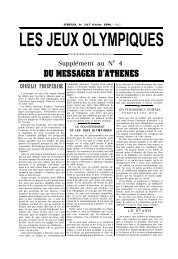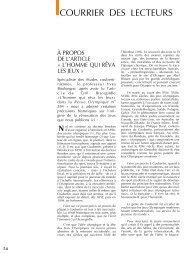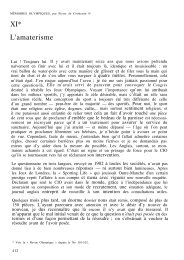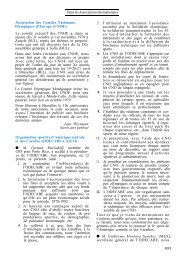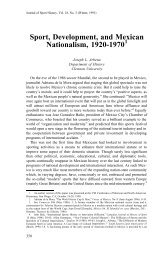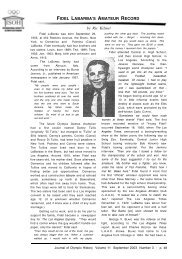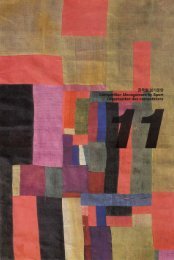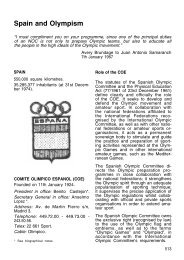Sport and Colonialism in 19th Century Australasia - LA84 Foundation
Sport and Colonialism in 19th Century Australasia - LA84 Foundation
Sport and Colonialism in 19th Century Australasia - LA84 Foundation
You also want an ePaper? Increase the reach of your titles
YUMPU automatically turns print PDFs into web optimized ePapers that Google loves.
vigour, strength <strong>and</strong> group spirit on the rugby paddock. "The<br />
recurrent rituals of the football field reconciled a pioneer<strong>in</strong>g<br />
ethos with the complexities of a modern <strong>and</strong> urban society." 12<br />
III<br />
The impression of British recreation <strong>and</strong> sport as <strong>in</strong>tegrative<br />
structures is, at best, superficial <strong>and</strong> at worst, an illu-<br />
sion. In village cricket all classes took part but at the end<br />
of the match the squire returned to his four posted bed, mansion<br />
<strong>and</strong> estate while the labourer stretched out on a palliasse <strong>in</strong><br />
his rented cottage. Prize fight spectators were roped off <strong>in</strong>to<br />
sections for the lower classes while the aristocratic <strong>and</strong> affluent<br />
lounged <strong>in</strong> r<strong>in</strong>g side hansom cabs, char-a-bancs <strong>and</strong> elegant<br />
coaches. Although pedestrianism at the end of the eighteenth<br />
century, <strong>and</strong> well <strong>in</strong>to the n<strong>in</strong>eteenth century, had<br />
aristocratic patronage <strong>and</strong> even upper class athletic <strong>in</strong>volve-<br />
ment, by the 1860s it had moved to enclosed grounds where the<br />
<strong>in</strong>teraction of a gambl<strong>in</strong>g sub-culture <strong>and</strong> the publican-assponsor<br />
made it predom<strong>in</strong>antly a lower class sport. The field<br />
sports of shoot<strong>in</strong>g, fox hunt<strong>in</strong>g, <strong>and</strong> fish<strong>in</strong>g, while developed<br />
<strong>in</strong> eighteenth century Engl<strong>and</strong>, were ref<strong>in</strong>ed, <strong>in</strong> terms of etiquette<br />
<strong>and</strong> protocol, <strong>in</strong> the n<strong>in</strong>eteenth century. A major function<br />
of field <strong>and</strong> equestrian sports was the reassurance of<br />
privilege <strong>and</strong> patronage. The eighteenth century game laws, by<br />
impos<strong>in</strong>g a property qualification on sportsmen, effectively<br />
denied all but county gentlemen the right to take game or even<br />
to possess a gun. Shoot<strong>in</strong>g as a sport for gentlemen <strong>and</strong> aristocrats<br />
<strong>and</strong> their guests took shape under the aegis of the l<strong>and</strong>owner<br />
with his country house, estates <strong>in</strong> Scotl<strong>and</strong> <strong>and</strong> parties<br />
of house guests. Such field sports were exclusively the recreational<br />
doma<strong>in</strong> of the nobility, aristocracy <strong>and</strong> l<strong>and</strong>ed gentry.<br />
It is significant that for the pioneer settlers of New<br />
Zeal<strong>and</strong>, there were no divisive extremes of social class or<br />
restrictive game laws, or socially appropriate parameters of<br />
behaviour to <strong>in</strong>hibit <strong>in</strong>formal hunt<strong>in</strong>g sports. Thus, while<br />
there were no stags to chase or foxes to hunt, there were many<br />
opportunities to shoot wild game <strong>and</strong> to develop the first truly<br />
69



